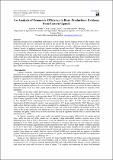| dc.contributor.author | Kenneth W Sibiko, Oscar I Ayuya, Eric O Gido, Joseph K Mwangi, Kenya Egerton | |
| dc.date.accessioned | 2020-08-27T08:54:48Z | |
| dc.date.available | 2020-08-27T08:54:48Z | |
| dc.date.issued | 2013 | |
| dc.identifier.uri | https://repository.maseno.ac.ke/handle/123456789/2442 | |
| dc.description.abstract | Bean has emerged to be an important cash crop as well as a staple food in Uganda; however, the country’s bean
productivity per unit area cultivated has been on the decline for the past ten years. This study estimated the
economic efficiency levels and assessed the factors influencing economic efficiency among bean farmers in
Eastern Uganda, by applying a stochastic frontier cost function and a two-limit Tobit regression model, based on
a random sample of 580 households. Findings revealed that the mean economic efficiency level was 59.94% and
it was positively influenced by value of assets, off-farm income, credit and farmers’ primary occupation. Based
on the findings from this study, there is need for government and stakeholders to train farmers on entrepreneurial
skills so that they can divest their farm profits into more income generating activities which would harness more
farming capital. Finally, there is a need for initiatives geared towards enhancing farmers’ access to adequate
credit for farming at affordable interest rates and using groups as collateral, so that they could invest more in
farming to increase their economic efficiency and farm productivity. | en_US |
| dc.subject | stochastic frontier approach, smallholder farmers, Tobit regression model | en_US |
| dc.title | An analysis of economic efficiency in bean production: evidence from Eastern Uganda | en_US |
| dc.type | Article | en_US |

